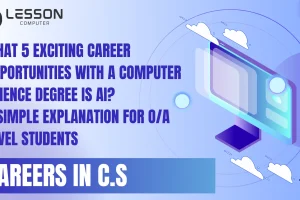
Computer Science O-level past papers 2210 – Everything Is Here To Khow!
O-Level Computer Science past papers 2210 helps students prepare for exams by practicing real questions. They provide insight into exam formats, key topics, and effective answering techniques, boosting confidence and improving chances of success.
This article will discuss Computer Science O-Level Past Papers and how they can help students prepare effectively for exams. We’ll cover the importance of practicing with past papers, tips for improving exam performance, and where to find these resources.
O-Level Computer Science Past Papers PDF:
Here are the past papers on O-level computer science:
O-level tuition Which can help you get an A Plus grade?
O-level computer science tuition can provide the help needed to achieve an A+ grade. With master guidance, students can master key topics and improve their understanding of concepts covered in Past Paper 1 and Past Paper 2. Tutors focus on exam techniques, time management, and targeted practice to help students excel. Regularly using past papers enhances problem-solving skills and boosts confidence, increasing the chances of achieving top grades.
What is the paper code for O-level computer science?
The paper code for O-Level Computer Science is 2210. This subject covers important topics like programming, computer systems, databases, and algorithms. The exam usually consists of two papers:
- Paper 1: Theory (covers fundamental concepts of computer science)
- Paper 2: Problem-solving and Programming (focuses on practical programming skills)
Students preparing for the 2210 O-Level Computer Science exam should practice with past papers to get familiar with the exam structure and improve their performance.
What is the easiest subject in O levels?
The easiest subject in O-Levels can vary depending on a student’s interests and strengths.
However, many students find subjects like Environmental Management, Art and Design, Business Studies, or English Language easier because they often involve more general knowledge, creativity, or practical skills rather than complex calculations or technical theories. Choosing a subject you enjoy and feel comfortable with makes it easier to study and perform well. Remember, what feels easy to one student may be challenging for another, so it’s important to pick subjects that align with your abilities and interests.
What are the hardest subjects at the O level?
Some of the hardest subjects in O-Level include Mathematics, Physics, Chemistry, Biology, Foreign Languages (like Mandarin), and History. These subjects are often considered challenging due to their complexity, detailed content, and need for problem-solving or memorization. Mathematics and Physics require strong analytical skills, while History involves learning and recalling many dates and events. Similarly, foreign languages like Mandarin demand consistent practice in order to master reading, writing, and speaking.
What are the four compulsory subjects for computer science?
The four compulsory subjects for students taking Computer Science, especially in O Level, typically include:
- Mathematics – Essential for understanding algorithms and problem-solving.
- English Language – Important for communication and writing code or documentation.
- Computer Science – Core subject covering programming, databases, and systems.
- Physics – Useful for topics like hardware, electronics, and logical systems.
These subjects build a strong foundation for students pursuing further studies in Computer Science or related fields. Some schools may also require a science subject, like Chemistry, depending on the curriculum.
Which grade is best in O level?
In O-Level exams, the best grade is A+ (90-100%), followed by A (80-89%). Achieving these grades shows excellent understanding and mastery of the subject. Other grades include:
- B (70-79%) – Good
- C (60-69%) – Satisfactory
- D (50-59%) – Pass
- E (40-49%) – Weak Pass
- U (below 40%) – Ungraded
point for A+ or A grades opens up more opportunities for higher studies and scholarships. Consistent practice, revision, and working with past papers can help students perform their best.
What is the lowest grade for O level?
The lowest grade in the O-Level is U (Ungraded), which means the student did not meet the minimum requirements to pass the subject. Other passing grades, starting from the lowest, are:
- E (40-49%) – Weak Pass
- D (50-59%) – Pass
Students receiving a U grade are advised to review their performance, work on weak areas, and consider retaking the exam if needed to improve their results.
What are the four compulsory subjects for computer science?
The four compulsory subjects for students taking Computer Science, especially in O Level, typically include:
- Mathematics – Essential for understanding algorithms and problem-solving.
- English Language – Important for communication and writing code or documentation.
- Computer Science – Core subject covering programming, databases, and systems.
- Physics – Useful for topics like hardware, electronics, and logical systems.
These subjects build a strong foundation for students pursuing further studies in Computer Science or related fields. Some schools may also require a science subject, like Chemistry, depending on the curriculum.
How many grades are there in Mauritius?
In Mauritius, the education system consists of a 2+6+5+2 structure, covering various levels of formal education. Here’s a breakdown of each sector:
- Pre-Primary (2 years): This stage includes kindergarten or preschool for young children, typically aged 3 to 5 years.
- Primary (6 years): Primary education starts at age 6 and lasts for six years, leading to the Primary School Achievement Certificate (PSAC) at the end.
- Secondary (5 years): After primary, students enter secondary school for five years. This level culminates in the Cambridge A-Level examinations.
- Tertiary (3 years or more): Following A-Levels, students can pursue higher education at universities or other institutions, which usually lasts for at least three years.
FAQs:
Practicing with past papers helps you become familiar with the exam format, improves your time management skills, and identifies areas where you need more study. It can boost your confidence before the exam.
To use past papers effectively, set aside specific study times, try to simulate exam conditions, and review the answers afterward using the marking schemes. Focus on questions you find challenging
While studying past papers, pay attention to key topics like programming, data representation, algorithms, and computer systems. These areas are often tested and are important for a solid understanding of the subject.
Yes, practicing with past papers can improve your chances of getting a better grade. They help reinforce your knowledge, improve your answering technique, and familiarize you with common question types.
Aim to practice with past papers regularly, especially as the exam date approaches. Consistent practice will help reinforce your learning and make you more comfortable with the exam format
Conclusion:
Using the 2210 O-Level computer science past papers is an effective way to prepare for exams. They help students understand the exam format, identify strengths and weaknesses, and improve their answering techniques. With consistent practice, students can build confidence and succeed in their studies and future careers in technology.
Discover more from Lesson Computer
Subscribe to get the latest posts sent to your email.



